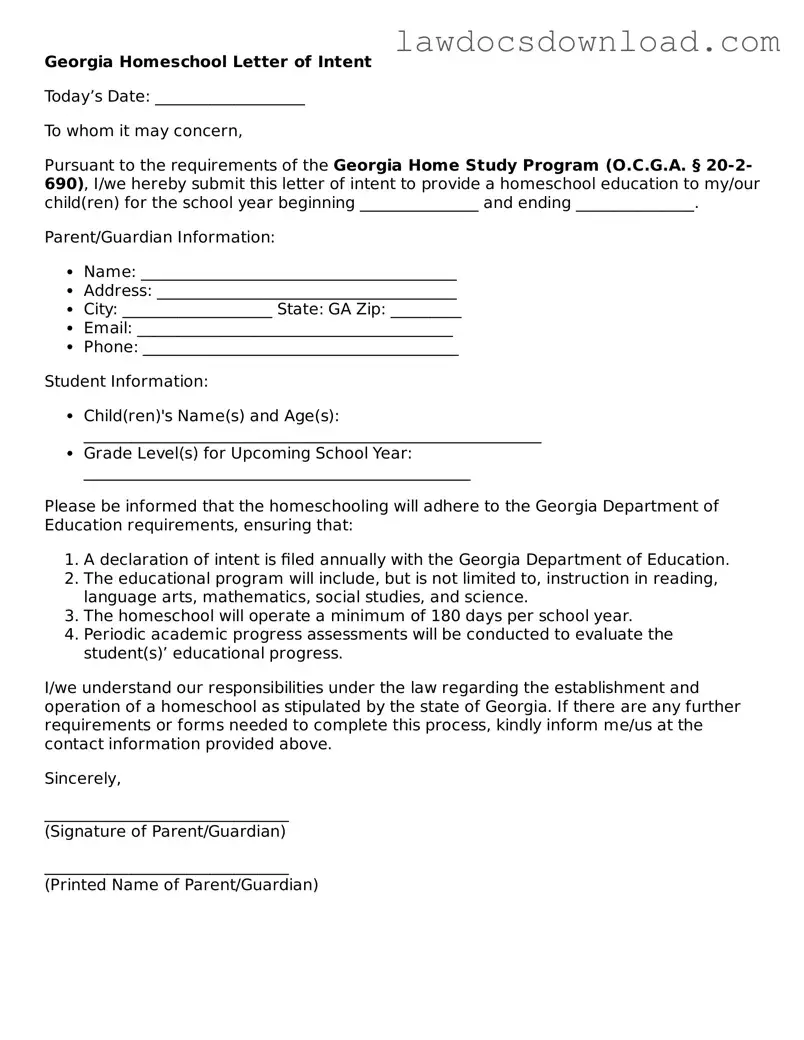Filling out the Georgia Homeschool Letter of Intent form is a critical first step for parents or guardians who choose to homeschool their children. Unfortunately, it's easy to make mistakes during this process. One common error is not filing the form on time. Georgia law requires that the form be submitted by September 1st or within 30 days after a homeschool program is established. Missing these deadlines can lead to unnecessary administrative issues.
Another oversight is the failure to include all required information. The form requests specific details about the homeschooling environment, including the number and ages of students, the location where homeschooling will take place, and the legal custodian's name and address. Sometimes, people inadvertently leave sections blank or provide incomplete information, which can delay the process.
Misunderstanding the legal requirements for the educational program is also a frequent mistake. The state of Georgia has certain standards that homeschooling must meet, such as the subjects taught and the minimum education hours. Some parents or guardians may not fully grasp these requirements when they fill out the form, leading to complications later on.
Incorrectly assuming that submitting the Letter of Intent is the final step in the process is another common error. In Georgia, homeschoolers must also submit an annual declaration of intent and attendance records. Some parents might overlook these ongoing obligations after the initial submission, which can result in non-compliance with state homeschooling laws.
Moreover, people often neglect to keep a copy of the submitted form for their records. This oversight can become problematic if there is ever a question about the homeschool's legal status or if the family needs to provide proof of compliance with state laws. A copy of the Letter of Intent, along with any correspondence from state or local education authorities, should be kept in a safe place.
Using outdated or incorrect forms is yet another pitfall. The Georgia Department of Education periodically updates the Letter of Intent form to reflect changes in law or policy. Parents or guardians who use an outdated version may find their submission returned or denied, leading to delays in legally commencing homeschooling.
Failure to update the Letter of Intent when there are significant changes to the homeschool environment is a further mistake. If a family moves or there is a change in custody, the state needs to be informed through an updated submission. Neglecting to do this can result incorrect records, complicating matters like transfers to public schools or compliance checks.
Some individuals mistakenly believe that the Letter of Intent is only for those new to homeschooling, neglecting to submit a new form each year. Georgia requires annual submission to keep state records current and ensure that all homeschools are operating within the legal framework.
Another error is inaccurately reporting the educational custodian. In cases where someone other than the parent or legal guardian is responsible for the child's education, this person's details must be accurately reflected on the form. Errors here can raise questions about the legitimacy of the homeschooling setup.
Lastly, an overlooked mistake involves failing to adjust the homeschooling program as students age out of compulsory education ages. Georgia law dictates compulsory attendance ages, and homeschooling documentation must be adjusted accordingly. However, some fail to update or cease submission of the Letter of Intent when their children reach these milestones, leading to unnecessary administrative follow-ups.

